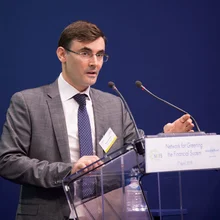
Green initiative: Network for Greening the Financial System
Voluntary body is driving efforts to tackle climate-related risks

In April 2019, officials from several central banks published a report and followed it up with a further document in October, promising several more over the next year. On the face of it, these events do not seem very revolutionary, or even unusual. But the documents issued by the Network for Greening the Financial System may come to be viewed as the most significant work done by central bankers over the last decade – or even longer.

A bold claim, perhaps, given the extraordinary measures that central banks have taken in monetary policy and financial regulation since the onset of the global financial crisis. But since the NGFS held its inaugural meeting in Paris in December 2017, it arguably has done more than any other organisation to address the relationship between climate change and other environmental risks, and finance.
Many sober and well-informed authorities have identified climate change as a major threat to global stability, so there is an important need to ensure the finance sector undertakes a proper accounting of the risks and returns. But for years, very little happened to create a working ‘green finance’ sector. Among the loudest critics of this lack of progress were several leading central bankers, including Bank of England (BoE) governor Mark Carney and his counterparts at Banque de France and the Netherlands Bank, François Villeroy de Galhau and Klaas Knot. Officials from eight countries began discussing how they could end the gridlock.
In December 2017, the central banks of China, Germany, France, Mexico, the Netherlands, Singapore and the UK, as well as the Swedish and French financial regulators, held the NGFS’s inaugural meeting. Frank Elderson, a director at the Netherlands Bank, became the network’s first chair, while Banque de France provided the staff with a small, nimble secretariat. From the start, this was not a network of authorities solely from developed countries – it also included the central bank of the world’s largest developing economy.

The NGFS began its work by establishing the outstanding problems in environmental finance and what participants in the financial sector thought needed to change. Some staff from its member institutions began researching the matter. One participant said that they faced the challenge that confronts all collaborations, that of finding a common starting point. In 2018, the NGFS held conferences in Amsterdam, just four months after its founding meeting, and Berlin, speaking mainly to academics, and then Singapore, meeting representatives of the private sector. The new body was also in constant contact with political representatives, gaining valuable insights on what some of the obstacles to change were.
These meetings allowed the NGFS to organise its work around some definite goals. In May 2018, it announced the creation of three ‘workstreams’ related to a specific field of green finance. The first workstream, chaired by Ma Jun, chief economist at the People’s Bank of China, investigated how environmental change would affect banking supervision. The second workstream, led by BoE executive director Sarah Breeden, studied the environmental aspects of macrofinancial policy, while the third, chaired by Deutsche Bundesbank executive board member Sabine Mauderer, looked at bringing green finance into the mainstream.
Staff members from the central banks of developed countries found their colleagues from emerging markets were in many ways interested in a wider environmental agenda. They wanted to talk about the financial implications of risks such as the degradation of air, soil and water as well as climate change. The three workstreams collaborated mainly online, anxious to avoid excessive air travel. In April 2019, their initial work was summarised in the first NGFS report, which made six specific, detailed recommendations for change. All the recommendations were agreed by the NGFS’s member institutions, in a striking display of consensus. Two of the suggested reforms were aimed at governments and the private sector, but four targeted the practices of the world’s central banks and financial regulators.
The documents issued by the NGFS may come to be viewed as the most significant work done by central bankers over the last decade – or even longer
There has been slower progress on the NGFS’s suggestions for change by governments than there has in its recommendations for change by central banks. The first NGFS report called for governments to ensure that they achieved “robust and internationally consistent climate and environment-related disclosure”. It also sought the development and adoption of an agreed environmental taxonomy for financial assets – in other words, internationally accepted standards for rating how environmentally friendly or unfriendly different assets were. Officials working with the NGFS accept there are significant political obstacles to the adoption of these goals. The governments of the European Union, for example, have proved unable to agree a ‘green taxonomy’, which prompted the European Central Bank’s new president, Christine Lagarde, to call on them to make greater progress. But the fact that governments are discussing these matters in such specific terms is itself in part due to the work of the NGFS.

The four recommended reforms for central banks and regulators are likely to have a significant impact on how these institutions tackle their job. In October, the network published the first result of its latest research: a handbook for central banks on how to integrate sustainability factors into the management of their own portfolios. Another team is writing a handbook for regulators and financial firms on assessing and managing environment-related risks. The NGFS is also working on getting central banks and regulators to bridge what some of its seconded officials call serious gaps in the data that different jurisdictions collect on the environmental aspects of finance. The network has also set itself the goal of building the ability of central banks and regulators to deal with green finance and to build their awareness of ecological problems. Notably, it is encouraging its members in wealthy countries to share knowledge and technical assistance with institutions in developing economies.

Meanwhile, the network grew rapidly, at a speed that surprised its administrators. After the NGFS had been in existence for a year, it had 24 members. In January 2020, the NGFS announced that it had grown to 54 full members from five continents, with another 12 institutions as ‘observers’. The Federal Reserve and other US financial regulators have had only informal contacts with the NGFS. Officials familiar with the situation say US domestic politics are currently preventing any closer collaboration. But there are signs that at least some lawmakers in Washington, DC, would like that to change.
While many challenges remain, the NGFS has proved itself to be far more than just a forum for discussions. It has carried out a considerable amount of research and consulted widely. Most importantly, the NGFS stood out during the past year for its efforts to synthesise its research into guidelines that will change the practices of central banks, financial regulators and private firms.
The Central Banking Awards were written by Christopher Jeffery, Daniel Hinge, Dan Hardie, Rachael King, Victor Mendez-Barreira, Alice Shen and William Towning
Only users who have a paid subscription or are part of a corporate subscription are able to print or copy content.
To access these options, along with all other subscription benefits, please contact info@centralbanking.com or view our subscription options here: www.centralbanking.com/subscriptions
You are currently unable to print this content. Please contact info@centralbanking.com to find out more.
You are currently unable to copy this content. Please contact info@centralbanking.com to find out more.
Copyright Infopro Digital Limited. All rights reserved.
As outlined in our terms and conditions, https://www.infopro-digital.com/terms-and-conditions/subscriptions/ (point 2.4), printing is limited to a single copy.
If you would like to purchase additional rights please email info@centralbanking.com
Copyright Infopro Digital Limited. All rights reserved.
You may share this content using our article tools. As outlined in our terms and conditions, https://www.infopro-digital.com/terms-and-conditions/subscriptions/ (clause 2.4), an Authorised User may only make one copy of the materials for their own personal use. You must also comply with the restrictions in clause 2.5.
If you would like to purchase additional rights please email info@centralbanking.com




